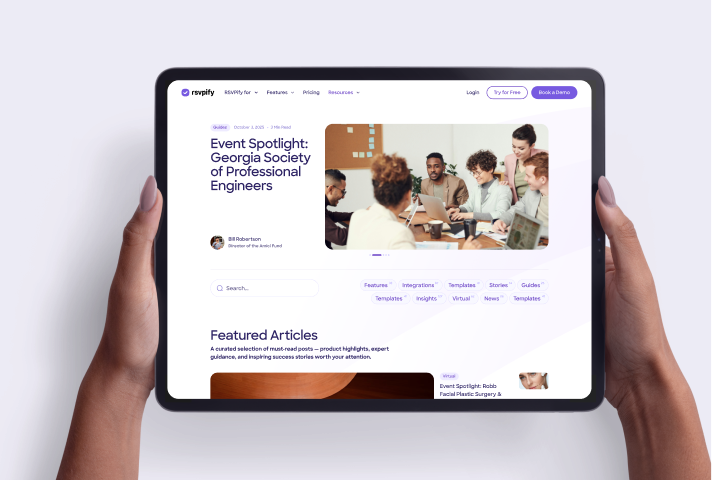Event planners today face a dual challenge: expectations for high-impact, engaging events remain sky-high, while budgets continue to shrink.
As Ari Driessen, CEO of RSVPify, put it in his recent interview with Meaghan Maybee of pc/nametag, “There’s a lot of pressure to do more with less, but that’s where technology like RSVPify really shines—helping planners stay organized and efficient without overspending.”
Whether you’re managing a corporate conference, nonprofit fundraiser, or community event, maximizing your event’s ROI is more crucial than ever.
According to MarketingCharts, 63% of marketers report that event budgets have decreased post-2023, but expectations for measurable outcomes have remained the same or even increased. This shift makes calculating and maximizing ROI a critical success factor for every event. Event planners must be more strategic than ever, prioritizing efforts that deliver both short-term wins and long-term value.
“Whether your budget is big or small, the expectation to deliver is still there. That’s why we focus on building tools that help planners simplify and succeed.” – Ari Driessen
One of the most effective strategies for improving ROI is identifying high-impact, low-cost activities that contribute to your event goals. From leveraging digital platforms for promotion and engagement to focusing on smaller, more targeted gatherings, event planners can stretch their budgets further without sacrificing quality.
Use Digital Marketing Channels: Social media platforms and email marketing remain some of the most cost-effective ways to promote your event and drive registrations. Tailor content to specific audience segments for higher engagement.
Leverage Data to Optimize Spend: Analyze past event data to identify which activities delivered the highest ROI and focus your budget there. Eliminate or minimize underperforming initiatives.
Embrace Hybrid and Virtual Formats: Offering virtual attendance options can reduce overhead costs while expanding your audience reach.
Prioritize High-Impact Partnerships: Collaborate with sponsors or partners who can offer financial support, in-kind services, or promotional reach in exchange for visibility at your event.
Streamline Operations with Technology: Automate administrative tasks like registration, communication, and check-in to save time and reduce labor costs.
Focus on Smaller, More Frequent Events: Micro-events and regional meetups can create meaningful engagement without the massive costs of large-scale conferences.
Invest in Content That Lasts: Record sessions and repurpose content for post-event marketing campaigns, extending the value of your event long after it ends.
Set Clear ROI Goals: Define what success looks like for your event upfront—whether it’s lead generation, revenue, or increased brand awareness.
Track Every Dollar: Monitor expenses in real time and adjust spending as needed to stay on budget. Incorporate event ticketing software to synergize reporting as well.
Collect and Analyze Post-Event Data: Conduct attendee surveys and analyze event performance to identify improvement areas for future events.
Optimize Your Tech Stack: Choose event management platforms that offer multiple functionalities to reduce the need for expensive standalone tools.
Be Transparent with Stakeholders: Communicate ROI metrics clearly to sponsors, leadership teams, and partners to secure future event support.
Think Long-Term: Consider the lifetime value of new connections and leads generated from your event, not just immediate outcomes.
About the Author
Adam Hausman co-founded RSVPify in 2013 and has been passionate about event tech and ticketing software ever since. Also founder of Greenlight Growth Marketing, he holds degrees from Indiana University (BA English/Psychology 2008) and the University of Illinois-Chicago (M.Ed. Secondary Education 2012). He lives in Maine with his wife, 2 kids, and 2 annoying cats.
Get the latest product updates, event planning tips, and industry insights — straight to your inbox.
You can unsubscribe at any time. Your email will only be used to send RSVPify updates and will never be shared.
